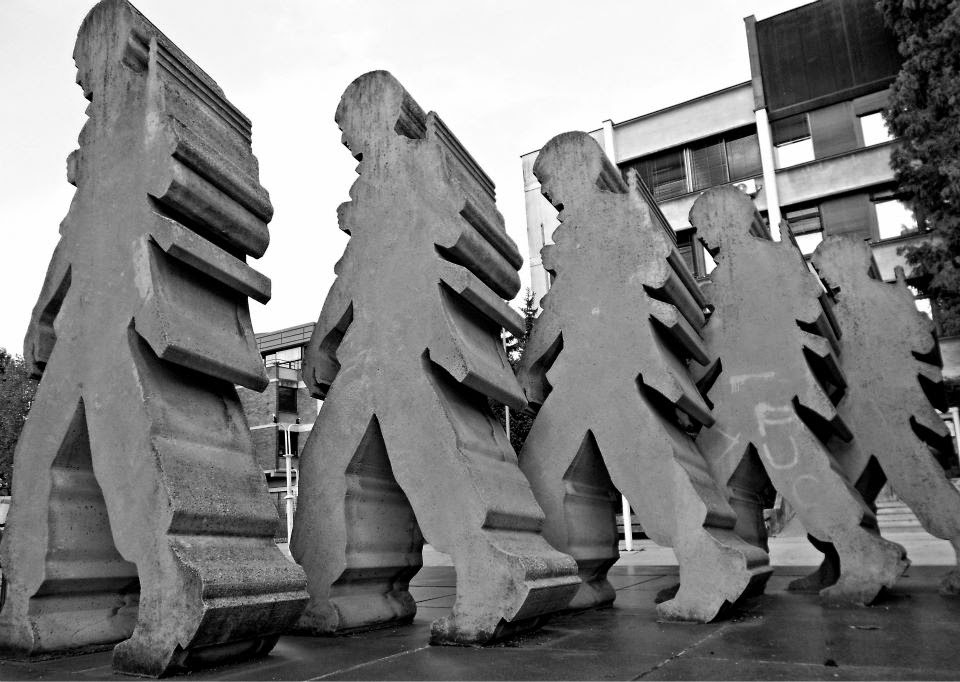Odločitev
oditi v Gambijo je bila plod želje po potovanju, po novih izkušnjah
in po pomoči tistim, ki jo najbolj potrebujejo. Želela sem si več,
kot le turistično izkušnjo, ki ti pokaže le eno plat zgodbe in
skrije toliko drugega, lepega, pristnega in drugačnega. Vedno sem
verjela, da je potrebno biti z ljudmi, živeti z njimi, se
pogovarjati in videti njihovo državo, skozi njihove oči, da jo
lahko resnično doživiš. Obenem pa te takšna izkušnja pripelje
bliže k sebi, kar je tudi želja mnogih, ki jim srce v zahodnem
svetu ne da miru in jih žene v neznano. V tako imenovane trenutke
bivanja oziroma zavedanja.
Teh
trenutkov je bilo veliko, v času mojega bivanja v Gambiji.
Trenutkov, ko vse postane kristalno jasno in se počutiš prisotnega
v svojem življenju, živega v trenutku, katerega vrednost občuduješ,
preden mu pustiš oditi med spomine. Trenutkov barv, sreče, smeha,
pesmi, nejevere, ponižnosti in še toliko več, prepletenih v
popolno sliko, spominek za temnejše dni. Sedeti skupaj v avtu,
medtem ko se zgodi še ena neverjetna stvar, in se spogledati ob
istem času: „To
je Afrika!“.
Opazovati sonce, ki zahaja nad Atlantikom, medtem ko poslušaš
pomirjujoče zvoke valov in šelestenje palm na popolni tropski
plaži, ki je kot z razglednice. Udeležiti se posebne ceremonije pri
nekomu doma in biti priča veselju, petju, plesu in smehu, ne da bi
bila postrežena ena sama kapljica alkohola. Pogled v očeh otroka,
ko končno uspe napisati eno samo črko, kar je nekaj, česar njegovi
starši nikoli niso mogli.
Brez
dvoma lahko rečem, da mi je Afrika dala veliko več, kot bi lahko
jaz kadarkoli dala njej. Moj skromen prispevek zbledi v primerjavi z
življenjskimi lekcijami, ki sem jih prejela in z neverjetnimi
ljudmi, ki so mi prekrižali pot in me sprejeli v svoja srca ter z
mano ravnali kot bi bila njihova. Oni so tisti, ki so me naučili, da
je treba ceniti vsak trenutek, se upočasniti, zaupati sama sebi in
slediti svojim sanjam, ne glede na vse. Tam sem tudi znova odkrila,
kaj mi je namenjeno početi, cilj za katerega se je vredno boriti,
cilj h kateremu je vredno stremeti.
Videla sem, kaj
je prava moč, ko sem spoznala toliko ljudi, ki živijo v skoraj
nemogočih okoliščinah, a vseeno uspejo ostati pozitivni in znajo
ceniti majhne dobre stvari v življenju. Ljudje, ki živijo z manj
kot 30 evri na mesec, pogosto brez tekoče vode in elektrike,
natlačeni v majhne prostore, ki pa ne bodo nikoli niti pomislili, da
ne bi delili še to malo, kar imajo, s tistimi, ki imajo še manj
sreče. Taksist, ki se bori, da bi preživel svojo ženo in 4 otroke
in dela vsak dan, cel dan, da denar ostareli beračici, ki se ustavi
ob njegovem oknu. Revna družina obdari botro svojega otroka,čeprav
imajo komaj kaj dati na mizo. Vozniki našega taksija, ki si delijo
eno samo štruco kruha. Oseba, ki da nekomu svoje zadnje kovance, ker
želi pomagati, čeprav to pomeni, da bo zdaj sama ostala brez.
Tujec, ki plača drugemu vožnjo, ker sta se pred tem zapletla v
kratek pogovor.
Ključ je deliti.
V Gambiji je običaj, da je vedno, ko ješ, vsak v tvoji bližini
dobrodošel, da se ti pridruži. Vedno deliš svoj obrok z drugim,
tudi če to pomeni manj hrane zate. Ljudje si ves čas pomagajo: z
denarjem, s hrano, z oblačili, čeprav so tukaj skoraj vsi revni.
Revni v materialnem pomenu namreč. Tukaj sem videla več sočutja,
prijaznosti in prave dobrodelnosti kot kjerkoli, kjer sem bila v
zahodnem svetu. Ljudje svoje bogastvo nosijo v srcu in zame bo to
vedno vredno več, kot ves denar na svetu.
Zame je bil
privilegij preživeti ta mesec v Gambiji in bom vedno hvaležna za to
izkušnjo. Hvala, mama Afrika!
.jpg)


.JPG)
.JPG)
.JPG)









.jpg)















.JPG)












